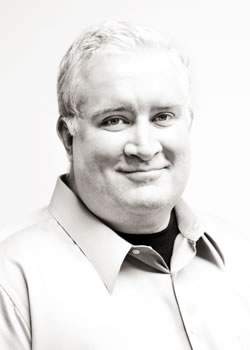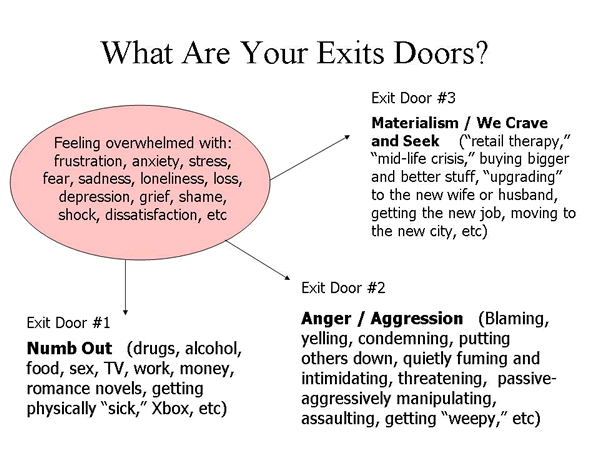
"To spare oneself from grief at all cost can be achieved only at the price of total detachment, which excludes the ability to experience happiness." - Dr. Erich Fromm
Underneath a deep and subtle belief that we are in control of our lives, there lives the groundless reality of impermanence. To a large extent, we are not in control of what happens to us, we only control how we react to what happens.
But we don't like to admit this reality, do we? And what if our dislike for this reality is really the basic problem with our lives? When we function as though we are somehow immune from life's suffering (aging, sickness, death, unfortunate circumstances, etc) we just make our pain that much worse.
 Doctor Parker Wilson, Psychotherapist, Counselor, And Director Of The Awakened Mind Institute, Denver Psychotherapy Center
Doctor Parker Wilson, Psychotherapist, Counselor, And Director Of The Awakened Mind Institute, Denver Psychotherapy Center
When I deeply believe that suffering won't happen to me, I set my self up for a long, disorienting fall; mostly because when that suffering does actually happen to me, I am shocked - I feel like I got hit by a truck. It is my belief that "it won't happen to me," or that "it won't happen to me for a long, LONG time," that creates so much intense trauma and pain.
In essence, it is our psychological reaction to the suffering inherent in this life (all of the ways we mindlessly and automatically react to and exit from uncomfortable emotion) that causes most of the pain in our lives.
Consider These Possible Realities:
- There is nothing wrong with aging, sickness, and death - there is nothing to be fixed.
- There is no one to become and there is no where to go. We are all met with the same predicable, universal sufferings (aging, sickness, death, unfortunate circumstances beyond our control, separations from people, places, and things, etc) - its just built into the deal.
- But just because we can not avoid some of the suffering in life, this does not mean that we can't learn to change our perceptions of it, and our reactions to it.
So What If Instead Of Fighting Our Suffering, We Learned To Anticipate And Accept It As An Essential Part Of Our Lives?
- What if we could stop expecting NOT to suffer?
- What if we could shift from avoidance, denial, minimization, exiting, and blame to acceptance, awareness, equanimity, perseverance, and responsibility?
- Do you think such a psychological shift would produce increased happiness in your life?
- Do you think this might be the pathway to psychological flourishing and joy?
Here is an equation from the field of clinical psychology: S = r X p. This simple equaltion translates as "suffering equals resistance times pain." The more we resist our experience of pain, the more suffering we create in our lives. For example, below is a depiction of how we typically resist our experience of afflictive emotion, including grief and loss. We tend to automatically exit the emotion in one of three common ways.

When Someone We Dearly Love Dies, What Is The Typical, Human Reaction?
Usually we are deeply shocked, and we automatically deny its reality. Denial is, of course, the most basic and immediate form of resistance. There are, however, many other ways to numb out.
Instead of being present with the experience and deeply remembering that death is unavoidable (that it comes for all of us), and then using that remembrance to cultivate compassion and patience for ourselves and everyone else, we instead seek to resist by numbing out the shock and pain with alcohol, drugs, sex, work, and TV. Of course, this takes the pain and multiplies it into suffering; we simply make our situation worse.
Perhaps we perceive the death as unjust and unreasonable, in which case our denial quickly transforms into anger. To sustain itself, anger seeks someone or something to blame, and once blame has been assigned and projected, it is easy to become aggressive with the object of blame. Often times this is a medical doctor who treated the loved one, a family member, or even God. Anger and aggression can only serve to intensify the disconnect and pain. Again, S = r X p
Moreover:
- We can also try to exit the grief and loss by purchasing our way out of it.
- We can spend money we don't have on things we don't need.
- We can get a newer model of spouse, buy a new car, or move to a new town. The temporary distraction of bright and shiny materialism can become a habituated reaction to afflictive emotion; a routine that we use to psychologically check out of our own experience of life.
What if taking these exit doors and splitting off from your own experience is just making life more difficult? What if exiting your own experience of life (even when bad things happen) is just intensifying your suffering? What if you only end up being more fragmented and disconnected from your own mind, and the suffering just gets worse? What then?
Modern Psychotherapy Has Realized That Disorientation And Pain Are As Much A Part Of A Full Life As Are Laughter And Joy
In fact, our experience of pain is crucial to our very evolution:
- Without pain, we have no frame of reference for what growth and progress are.
- Without the experience of grief, there can be no resolution in increased patience.
- Without the experience of loss, there can be no cultivation of deep insight and compassion.
These qualities walk hand in hand, and it is our task as humans beings to realize that. The fact that we can choose how to react, the very fact that we can learn to work with our minds - this is the very crux of happiness. If we do not find ways to transform our suffering into enlightenment, we simply remain confused, embittered, and shut down.
